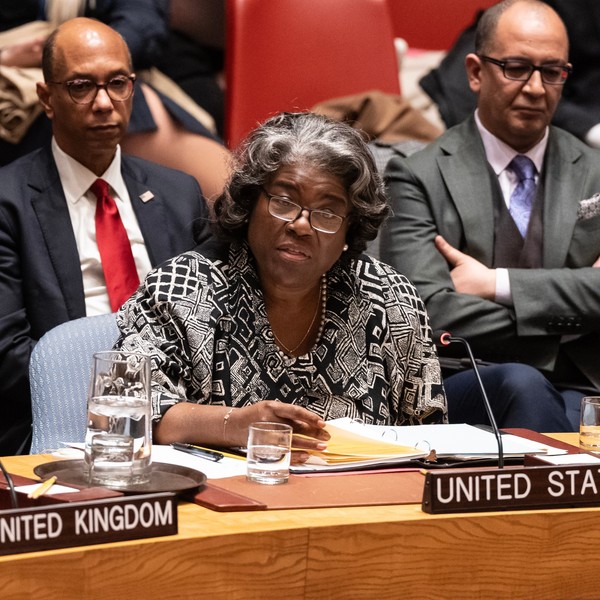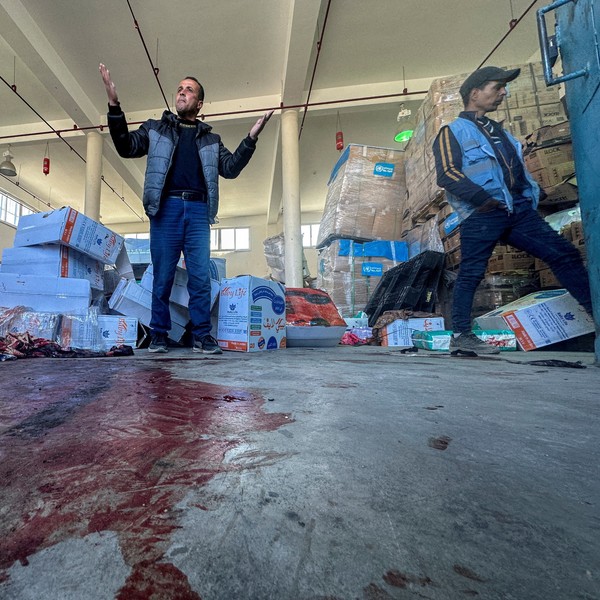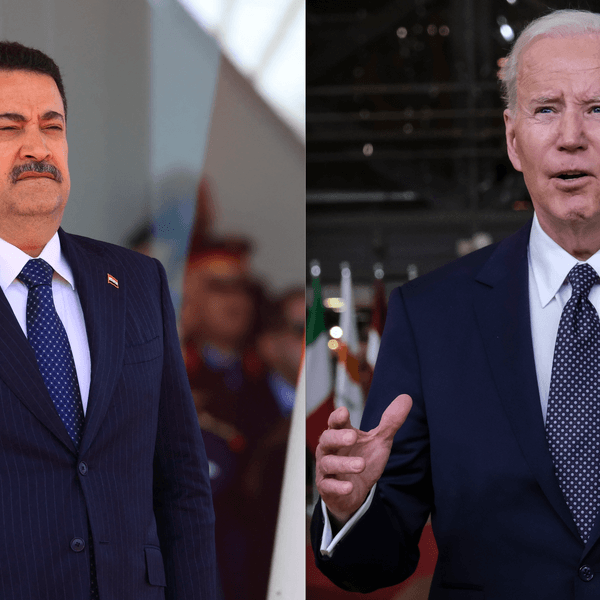Today we face an avoidable crisis between the United States and Russia that was predictable, willfully precipitated, but can easily be resolved by the application of common sense.
But how did we get to this point?
Allow me, as someone who participated in the negotiations that ended the Cold War, to bring some history to bear on the current crisis.
We are being told each day that war may be imminent in Ukraine. Russian troops, we are told, are massing at Ukraine’s borders and could attack at any time. American citizens are being advised to leave Ukraine and dependents of the American Embassy staff are being evacuated. Meanwhile, the Ukrainian president has advised against panic and made clear that he does not consider a Russian invasion imminent. Vladimir Putin has denied that he has any intention of invading Ukraine. His demand is that the process of adding new members to NATO cease and that Russia has assurance that Ukraine and Georgia will never be members.
President Biden has refused to give such assurance but made clear his willingness to continue discussing questions of strategic stability in Europe. Meanwhile, the Ukrainian government has made clear it has no intention of implementing the agreement reached in 2015 for reuniting the Donbas provinces into Ukraine with a large degree of local autonomy — an agreement with Russia, France, and Germany that the United States endorsed.
Was this crisis avoidable?
In short, yes. In 1991, when the Soviet Union collapsed, many observers wrongly believed they were witnessing the end of the Cold War when It had actually ended at least two years earlier by negotiation and was in the interest of all the parties. President George H.W. Bush hoped that Gorbachev would manage to keep most of the 12 non-Baltic republics in a voluntary federation.
Despite the prevalent belief held by both the DC foreign policy establishment and most of the Russian public, the United States did not support, much less cause the break-up of the Soviet Union. We supported the independence of Estonia, Latvia, and Lithuania, and one of the last acts of the Soviet parliament was to legalize their claim to independence. And — despite frequently voiced fears — Vladimir Putin has never threatened to re-absorb the Baltic countries or to claim any of their territories, though he has criticized some that denied ethnic Russians the full rights of citizenship, a principle that the European Union is pledged to enforce.
Since Putin’s major demand is an assurance that NATO will take no further members, and specifically not Ukraine or Georgia, obviously there would have been no basis for the present crisis if there had been no expansion of the alliance following the end of the Cold War, or if the expansion had occurred in harmony with building a security structure in Europe that included Russia.
Was this crisis predictable?
Absolutely. NATO expansion was the most profound strategic blunder made since the end of the Cold War. In 1997, when the question of adding more NATO members arose, I was asked to testify before the Senate Foreign Relations Committee. In my introductory remarks, I made the following statement:
“I consider the administration's recommendation to take new members into NATO at this time misguided. If it should be approved by the United States Senate, it may well go down in history as the most profound strategic blunder made since the end of the Cold War. Far from improving the security of the United States, its Allies, and the nations that wish to enter the Alliance, it could well encourage a chain of events that could produce the most serious security threat to this nation since the Soviet Union collapsed.” Indeed, our nuclear arsenals were capable of ending the possibility of civilization on Earth.
But that was not the only reason I cited for including rather than excluding Russia from European security. As I explained to the SFRC: “The plan to increase the membership of NATO fails to take account of the real international situation following the end of the Cold War, and proceeds in accord with a logic that made sense only during the Cold War. The division of Europe ended before there was any thought of taking new members into NATO. No one is threatening to re-divide Europe. It is therefore absurd to claim, as some have, that it is necessary to take new members into NATO to avoid a future division of Europe; if NATO is to be the principal instrument for unifying the continent, then logically the only way it can do so is by expanding to include all European countries. But that does not appear to be the aim of the administration, and even if it is, the way to reach it is not by admitting new members piecemeal.”
The decision to expand NATO piecemeal was a reversal of American policies that produced the end of the Cold War. President George H.W. Bush had proclaimed a goal of a “Europe whole and free.” Gorbachev had spoken of “our common European home,” had welcomed representatives of East European governments who threw off their communist rulers and had ordered radical reductions in Soviet military forces by explaining that for one country to be secure, there must be security for all.
President Bush also assured Gorbachev during their meeting in Malta in December, 1989, that if the countries of Eastern Europe were allowed to choose their future orientation by democratic processes, the United States would not “take advantage” of that process. (Obviously, bringing countries into NATO that were then in the Warsaw Pact would be “taking advantage.”) The following year, Gorbachev was assured, though not in a formal treaty, that if a unified Germany was allowed to remain in NATO, there would be no movement of NATO jurisdiction to the east, “not one inch.”
These comments were made to Gorbachev before the Soviet Union broke up. Once it did, the Russian Federation had less than half the population of the Soviet Union and a military establishment demoralized and in total disarray. While there was no reason to enlarge NATO after the Soviet Union recognized and respected the independence of the East European countries, there was even less reason to fear the Russian Federation as a threat.
Was this crisis willfully precipitated?
Alas, the policies pursued by Presidents George W. Bush, Barack Obama, Donald Trump, and Joe Biden have all contributed to bringing us to this point.
Adding countries in Eastern Europe to NATO continued during the George W. Bush administration but that was not the only thing that stimulated Russian objection. At the same time, the United States began withdrawing from the arms control treaties that had tempered, for a time, an irrational and dangerous arms race and were the foundation agreements for ending the Cold War. The most significant was the decision to withdraw from the Anti-Ballistic Missile Treaty which had been the cornerstone treaty for the series of agreements that halted for a time the nuclear arms race. After 9/11, Putin was the first foreign leader to call President Bush and offer support. He was as good as his word by facilitating the attack on the Taliban regime in Afghanistan. It was clear at that time that Putin aspired to a security partnership with the United States as the jihadist terrorists who were targeting the United States were also targeting Russia. Nevertheless, Washington continued its course of ignoring Russian (and also allied) interests by invading Iraq, an act of aggression that not only Russia opposed, but also France and Germany.
Although President Obama initially promised improved relations through his “reset” policy, the reality was that his government continued to ignore the most serious Russian concerns and redoubled earlier American efforts to detach former Soviet republics from Russian influence and, indeed, to encourage “regime change” in Russia itself. American actions in Syria and Ukraine were seen by the Russian president, and most Russians, as indirect attacks on them.
And so far as Ukraine is concerned, U.S. intrusion into its domestic politics was deep, actively supporting the 2014 revolution and overthrow of the elected Ukrainian government in 2014.
Relations soured further during President Obama’s second term after the Russian annexation of Crimea. Then things got worse during the four years of Donald Trump’s tenure. Accused of being a Russian dupe, Trump passed every anti-Russian measure that came along, while at the same time flattering Putin as a great leader.
Can the crisis be resolved by the application of common sense?
Yes, after all, what Putin is demanding is eminently reasonable. He is not demanding the exit of any NATO member and he is threatening none. By any common sense standard it is in the interest of the United States to promote peace, not conflict. To try to detach Ukraine from Russian influence — the avowed aim of those who agitated for the “color revolutions” — was a fool’s errand, and a dangerous one. Have we so soon forgotten the lesson of the Cuban Missile Crisis?
Now, to say that approving Putin’s demands is in the objective interest of the United States does not mean that it will be easy to do. The leaders of both the Democratic and Republican parties have developed such a Russo-phobic stance that it will take great political skill to navigate such treacherous political waters and achieve a rational outcome.
President Biden has made it clear that the United States will not intervene with its own troops if Russia invades Ukraine. So why move them into Eastern Europe? Just to show hawks in Congress that he is standing firm?
Maybe the subsequent negotiations between Washington and the Kremlin will find a way to allay Russian concerns and defuse the crisis. And maybe then Congress will start dealing with the growing problems we have at home instead of making them worse.
Or so one can hope.
This was originally posted in longer form at ACURA















